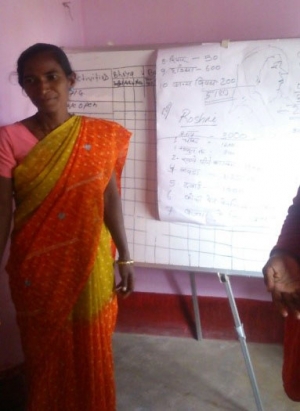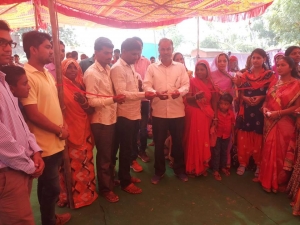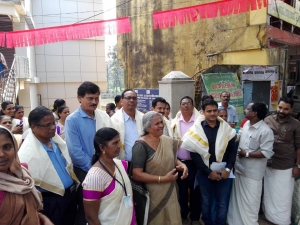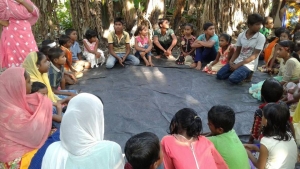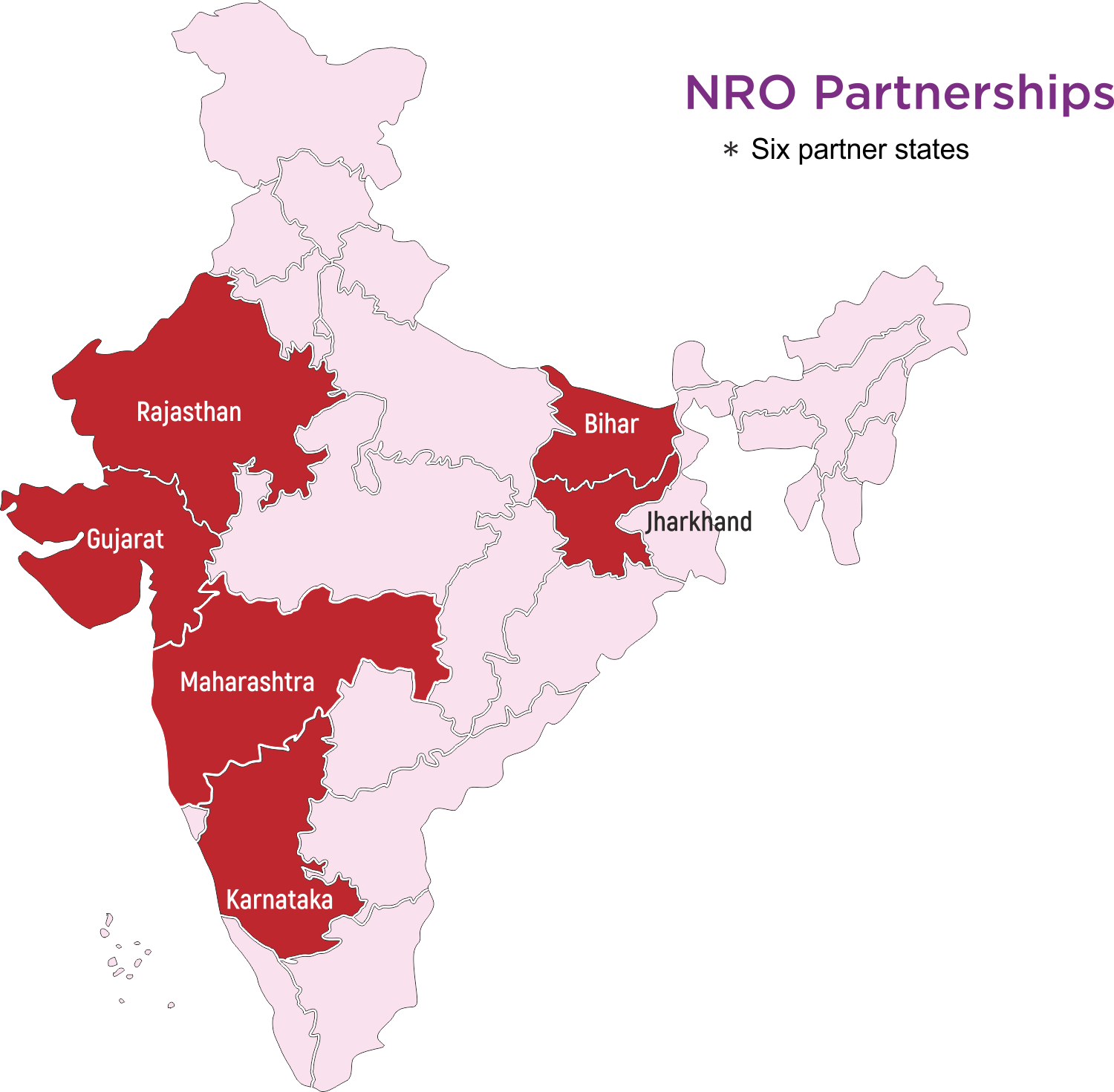Kudumbashree NRO
Bringing light into the lives of people!!!

This story of Jhingi has been one of resilience that has helped her and entire villagers of Horlor village, Ruidih Panchayat to overcome from the darkness that had hovered since 2013 due to transformer failure in her village. Once meek and feeble, reluctant to raise voice against ill things, now a transformed lady who together with other SHG women has brought light into the lives of villagers.
It was September 2013, when the transformer caught fire due to overloading and the entire village went into the darkness. In my village Gram Sabha is conducted every month which is presided over by munda. In the year that rolled by, this issue just became one of the agendas of gram sabha, which was discussed, debated but was never acted upon to solve the issue. That was the month of August in the year 2014, when I was identified as a LRG for my village and received training from NRO, Kudumbashree. I was taught regarding the importance of samuh (Self Help Group) and the gram sabha which have a power to solve difficult problems.
After few months of joining as a LRG, I realised this issue can be taken forward by taking other SHG women into a loop. So, in the EC meeting of VO members I discussed about the problem. VO EC members together with president, secretary and active women decided to come forward and disentangle the issue. In the meeting itself we wrote an application stating the status of electricity in the village and decided to present that application in the coming gram sabha.
In the gram sabha, we discussed about the content of application and took the signatures of villagers on it and it was decided there that the application will be handed over to the MLA. I together with SHG women went to meet MLA and had discussion on the problem which we had been facing for a year and half then. He said he already had talked to SDO regarding ‘Horlor’s transformer’. SDO had said to him that electricity bill for each consumer had accumulated to around Rs 1718 which had not been paid and was creating encumbrances in getting a new transformer. We ensured MLA that the outstanding bill which had accumulated will be paid off. We fixed the date to meet SDO in Vidyut Karyalay at Chakradharpur. Before going to Chakradharpur, SHG meeting was called and the whole matter was discussed in the SHG meeting. It was then decided to collect Rs 20 from each member. It was the month of May 2015; I was accompanied by VO president, active woman and other SHG members to Chakradharpur to meet SDO at Vidyut Karyalay. The collected money from the SHG members was used to pay the travel expenses. We were informed in the office that SDO was out of the state. We all were disappointed with the news and came back.
In June, we again went to Chakradharpur to meet SDO. This time we were fortunate enough to meet him. We gave application to him and explained the issue and we also ensured that SHG women will collect the outstanding amount from the villagers. We were sent saying that we will soon be informed about the status of transformer. Two months rolled by, but we didn’t receive information from the Vidyut Karyalay. In our monthly gram sabha of August we called our Mukhya and Panchayat Samiti Sadasya. There we formed Vidyut Samiti comprising of LRG and other three members, assigning them the role to take care of the regular payment of the bill and electricity issues in coming future. It was also decided that Mukhya, Panchayat Samiti Sadasya and Vidyut Samiti Sadasya will accompany us to Vidyut Karyalay. In the first week of September, 2015 as decided in the gram sabha Mukhya, Panchayat Samiti Sadasya and I went to meet SDO. This time he agreed to give new transformer but before that he asked to submit few necessary documents. (Consumer List, Bil etc.). In the month of December, President of Vidyut Samiti got a call from Vidyut karyalay asking him to take Transformer from the office.
Finally, after two years of spending into darkness electricity came in the month of December last year in our village. Since electricity is now in our village we are planning to have ‘Jal Minar’ (Overhead Water Tank) in our village.
Festival market organized in Kota, Rajasthan
A festival market was jointly organized in Jhadgaav panchayat (Kota) by Micro Enterprise Consultants (MEC) and block representatives from Rajeevika, the State Rural Livelihood Mission (SRLM) of Rajasthan. The market which was inaugurated by panchayat representatives and block staff members, saw a number of entrepreneurs participating in it. In rural areas where micro enterprises struggle due to lack of basic facilities and absence of marketing platforms, such initiatives provide entrepreneurs with an opportunity to access a large customer base and increase their earnings.
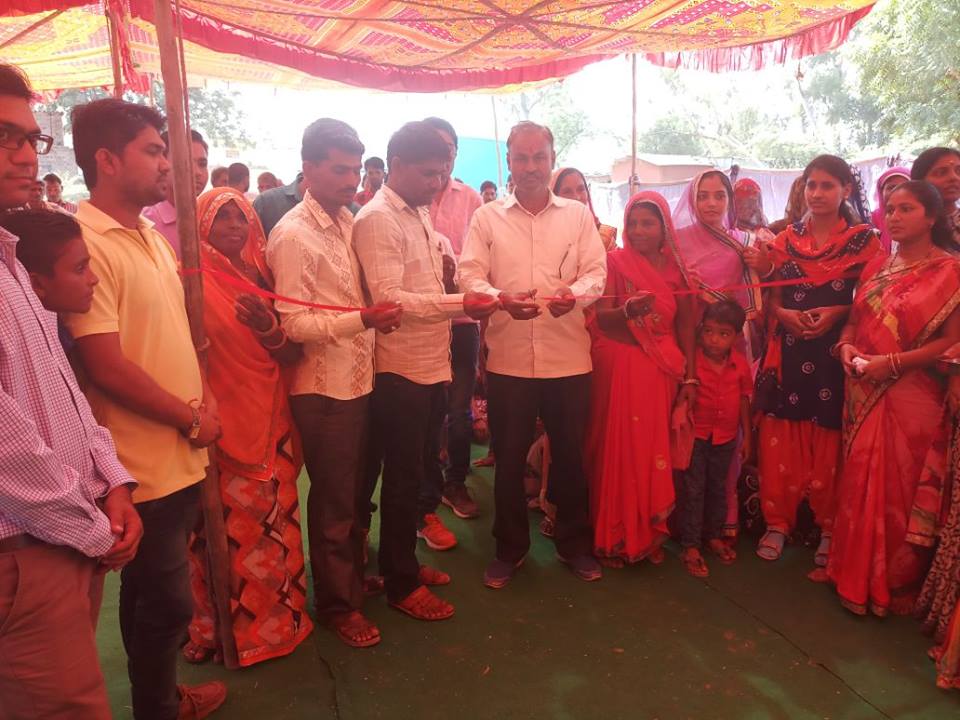
OLM Project Directors visit to Vazhoor Gram Panchayat, Kottayam
“The visit to Kerala to see the work undertaken by Kudumbashree women has been a great learning experience. The convergence model implemented in Kerala has empowered the local people here. Initiatives like Asraya and Balasabha are excellent examples of how an active and conscious community work together to support the vulnerable and bring about social change”.
-Saroj Kumar Mishra, Project Director DRDA, Odisha Livelihoods Mission
Recently eleven Project Directors from Odisha Livelihoods Mission (OLM) had visited Kerala for gaining a better understanding of the convergence model implemented in the state. Seen here are the officials being welcomed by Vazhoor (Kottayam) gram panchyat president.
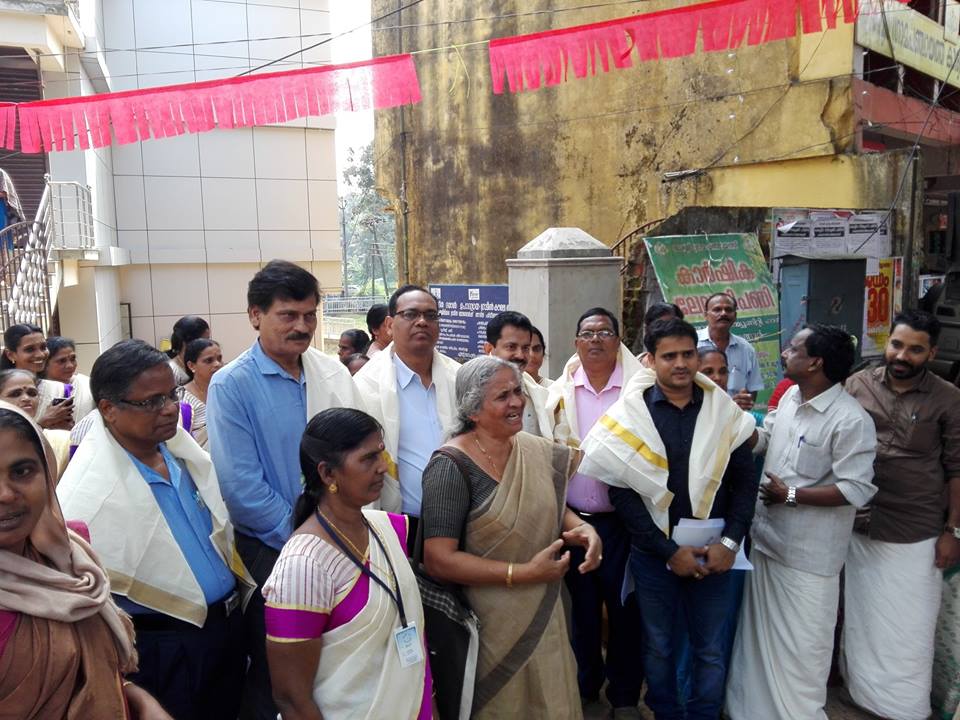
Balasabha in Nagaon, Assam
Children’s collectives offer unique opportunities of learning where development of social, physical and intellectual skills take place. Kudumbashree has been forming Balsabhas, better known as children’s collectives, in partner states with an objective of shaping and influencing their progress within the collective and by the collective. Seen here, are children of Balsabha newly formed in Lawkhowa block, Nagaon (Assam). The Balsabha is regularly supervised by the Village Organisations(VO) and activities are organized as part of promoting their overall well-being.
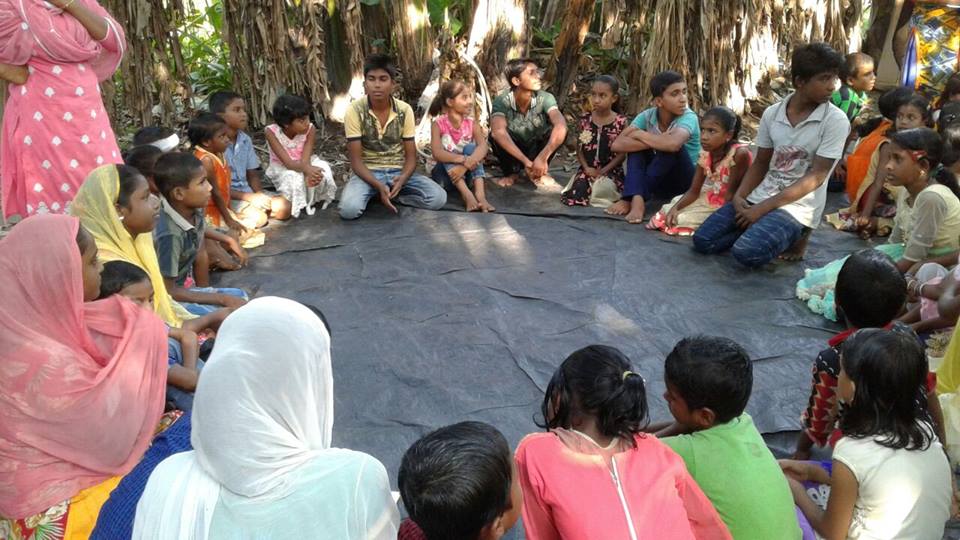
Evolution
Since its inception in the year 2012, Kudumbashree NRO has steadily expanded the scope and extent of work by developing excellent models for community based organizations in the area of convergence and enterprise promotion. Bihar and Jharkhand were first among the states to have worked in the area of enterprise promotion with Kudumbashree NRO in the year 2012. Followed by states like Maharashtra, Karnataka, Jharkhand and Assam under PRI-CBO convergence project in the year 2013. Presently, partnerships have been progressed to seventeen states and one union territory.
2012
- Kudumbashree designated as NRO by NRLM
2013
- Launch of Kudumbashree-NRO Secretariat
- MoU signed with Bihar and Jharkhand for MEC Project
- Commencement of MEC training in Bihar and Jharkhand
2014
- MoUs signed with Maharashtra, Karnataka, Odisha, Jharkhand and Assam for PRI-CBO Convergence Project
- MoU signed with Maharashtra for MEC Project
- Participatory Assessment of Entitlements (PAE) rolled out in partner-States
- Commencement of MEC training in Maharashtra and Karnataka
- Formation of MEC groups in Bihar and Jharkhand
- Enterprise Development commences in Bihar
2015
- MoU signed with Sikkim for Special Project and Rajasthan for PRI-CBO Convergence Project
- MoU signed with Rajasthan and Gujarat for MEC Project
- Commencement of MEC training in Rajasthan and Gujarat
- Entitlement Access Plan (EAP) rolled out in partner-States
- MEC groups formed in Karnataka and Maharashtra
- Kudumbashree designated as NRO for SVEP
- Enterprise Development commences in Maharashtra and Karnataka
2016
- MoUs signed with Bihar and Rajasthan for KS-NRO support in SVEP implementation
- Kudumbashree NRO starts implementing SVEP in two blocks of Kerala- Vadavukode & Parakkode
- MoU signed with Goa for PRI-CBO Convergence Project
- Gram Panchayat Poverty Reduction Plan (GP2RP) rolled out in partner-States
- Performance Tracking System (PTS) mobile based app piloted in Jharkhand
- Proposal for scaling of PRI-CBO Convergence Project in Assam, Odisha, Jharkhand and Maharashtra
- Selection of Internal Mentors conducted in Assam, Odisha, Jharkhand and Maharashtra
- Selection of MEC Master Trainers commences in Bihar and Jharkhand
- MEC groups formed in Gujarat and Rajasthan
- Formalisation of linkages between Community Institutions and MEC Groups in Bihar
- Enterprise Development commences in Rajasthan and Gujarat
- MEC project scaling initiated in Jharkhand
2017
- MoUs signed with Chhattisgarh, Tripura and Manipur under PRI-CBO Convergence and Lakshadweep under special project
- MoUs signed with Madhya Pradesh, Uttar Pradesh and Andhra Pradesh under SVEP
- Scale up of SVEP implementation to 12 more blocks in Kerala
- PRI-CBO Convergence project scaling up initiatives in Jharkhand, Assam and Sikkim
- Proposal for scaling of PRI-CBO Convergence Project in Odisha & Rajasthan
- Internal mentors selected in Jharkhand, Assam, Rajasthan under PRI-CBO Convergence Project
- Developed CPC manual & Toolkit under PRI-CBO Convergence project for its universalization by NRLM
- GSLP piloted in Rajasthan
2018
- Internal Mentor and Master Trainer selection under MEC project in Rajasthan
- MoUs signed with Haryana, Andhra Pradesh and Chhattisgarh under SVEP
- MoU signed with Uttar Pradesh under PRI-CBO Convergence Project
- Conclusion of MEC project in Rajasthan
SVEP

BACKGROUND
The Start-up Village Entrepreneurship Program (SVEP) is the sub-scheme under the National Rural Livelihoods Mission initiated by the Ministry of Rural Development with the objective of addressing the issue of poverty and unemployment by encouraging entrepreneurship initiatives among the rural youth in the country. SVEP aims to establish systems that work on knowledge dissemination, advisory and financial support to the entrepreneurs that can lead to, identification and assisting of rural start-up entrepreneurs and provide handholding support to set up the right enterprise and sustain the same in the long run. For this purpose, a pool of block-level community cadre will be trained in business management to support the rural poor to set up their enterprises and handhold them for at least six months of start-up.
In the year 2016, Kudumbashree NRO was entrusted with the task of implementing SVEP in Kerala along with three other states- Jharkhand, Rajasthan, and Bihar by NRLM. The MEC model implemented by Kudumbashree in Kerala and in partner states was among the models that went into the design of SVEP. Kudumbashree NRO played a crucial role in the development of the concept of SVEP.
PROFILE
Kudumbashree NRO has been implementing SVEP in Kerala, Jharkhand, Rajasthan and Bihar since 2016. It was entrusted to implement SVEP in 11 more states - Chhattisgarh, Uttar Pradesh, Madhya Pradesh, Andhra Pradesh, Haryana, Sikkim, Tripura, Telengana, Mizoram, Arunachal Pradesh and Punjab. At present, the project is being implemented in Uttar Pradesh, Madhya Pradesh, Andhra Pradesh, Haryana, Sikkim, Tripura, Telengana, Mizoram, Punjab, Bihar, Rajasthan. Jharkhand, Chattisgarh and Kerala.
|
PROJECT FOOTPRINT |
|
| No. of states | 15 |
| No. of districts | 74 |
| No. of blocks | 22 |
| No of CRP-EPs trained | 1800 |
| No. of mentors | 96 |
| Total no. of Micro Enterprises promoted | 102,576 |
MEC Project
BACKGROUND
Micro-enterprises of the poor that are developed as part of poverty alleviation programmes often face serious operational challenges. Persistent hand-holding and capacity building support are needed to ensure these enterprises evolve into sustainable sources of livelihood for the poor. Based on this understanding, the Micro Enterprise Consultant (MEC) project focusses on developing field level structures which can provide multi-dimensional support to the rural micro enterprises of the poor.
As part of the MEC project, individuals are identified and trained from local communities to become Micro-enterprise Consultants. The MEC are responsible for providing hand-holding support to potential and existing rural entrepreneurs on a chargeable basis. The MECs are also encouraged to partner each other and form firms that leverage their diverse skill sets. These MEC firms offer a wide range of business consulting services to rural entrepreneurs. To provide rural entrepreneurs support services such as performance tracking of their enterprises and micro-enterprise accounting, the MEC project introduced an IT enabled real-time information system called Performance Tracking System (PTS) in its pilot locations. Since enterprises form a valuable part of the diverse pool of livelihoods that poor families depend on, the project envisages linking the Community Based Organisations (CBO) with MEC Firms to create mechanisms for the promotion of enterprise development among the poor in its pilot locations.
PROFILE
The MEC project has been implemented in six states across India including Bihar, Jharkhand, Karnataka, Maharashtra, Gujarat and Rajasthan on a pilot basis.
| PROJECT FOOTPRINT | |
| No. of partner states | 6 |
| No. of districts | 17 |
| No. of blocks | 180 |
| No. of gram panchayats | 6014 |
| No of MEC trained | 684 |
| No. of mentors | 14 |
Special Projects
BACKGROUND
Kudumbashree NRO provides technical support to partner-States for short-term special projects based on their needs. These special projects are customized to meet the requirements of the partner-States based on NRLM. Currently, Kudumbashree NRO is in partnership with Goa, Lakshadweep and Sikkim for the implementation of short-term special projects in pilot locations. With its partnership with these states/union territory, the objective is to create a model for supporting both PRI and CBO networks and for developing a community based system for supporting micro enterprises for effective convergence leading to sustainable and better implementation of NRLM. In the long run the partnership is expected to result in the creation of a robust institutional structure of the poor that is closely linked to local governance and development.
| PROJECT FOOTPRINT | |
| No. of partner states/union territory | 3 |
| No. of districts | 5 |
| No. of pilot blocks/dweeps | 26 |
| No. of gram panchayats/village dweep panchayats | 210 |
| No. of CRPs trained | 728 |
| No. of mentors | 13 |
PRI-CBO Convergence

BACKGROUND
The PRI-CBO Convergence approach is based on the premise that if institutions of the poor such as Community Based Organisations (CBO) and constitutionally mandated body like Panchayati Raj Institutions (PRI) collaborate with each other to work for the development of the village, they can significantly enhance the livelihood and social security of the vulnerable and poor. The PRI-CBO Convergence project builds capacities of PRI and SHG network to work together to strengthen the poor’s access to entitlements and enhance the public’s participation in local governance for improved service delivery. To achieve this, a cadre of motivated community individuals called Local Resource Group (LRG) are nurtured in partner States. The LRGs are expected to work towards enabling convergence of PRI and CBO for the development of the village. As part of the project strategy, the CBOs and PRI are introduced to participatory assessment, planning and monitoring tools to help local communities build awareness and plan for their access to schemes and benefits.
PROFILE
The PRI-CBO convergence project has been implemented in twelve states till now across India and includes states like Assam, Jharkhand, Rajasthan, Karnataka, Maharashtra, Odisha, Chhattisgarh, Manipur, Uttar Pradesh, and Tripura. Arunachal Pradesh and Meghalaya are the latest addition to the states where the PRI-CBO convergence project has established its presence. At present, the project is functioning only in states like Assam, Meghalaya, Arunachal Pradesh, Manipur, Mizoram and Uttar Pradesh.
| PROJECT FOOTPRINT | |
| No. of partner states | 13 |
| No. of Districts | 61 |
| No. of Blocks | 105 |
| No. of Gram Panchayats | 950 |
| No. of Mentors | 60 |
Annual Report (2014-2015)
Kudumbashree Annual Report
